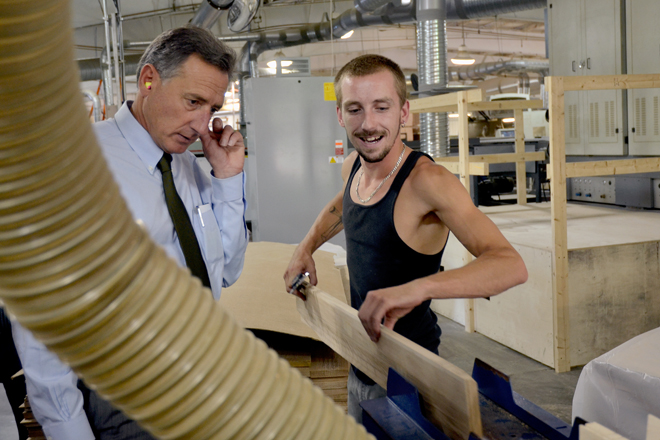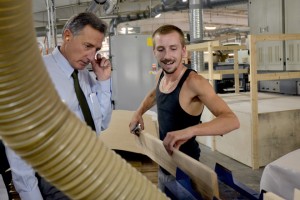

by Joseph Gresser
copyright the Chronicle August 1, 2012
Governor Peter Shumlin visited two new high tech businesses that are bringing much needed jobs to the Northeast Kingdom last week.
Both are companies that take advantage of high-tech production methods. For one, Numia Medical Technology, a maker of infusion pumps used for administering medications in hospitals, that is not a startling discovery.
The use of precision technology at a forest products factory in North Troy, may be more of a surprise.
That plant, Appalachian Engineered Flooring, uses high technology to create top-of-the-line tongue-and-groove hardwood flooring, according to company officials.
The Governor was welcomed, on his July 25 visit, by Appalachian’s president, Jean Leduc and the company’s 18 employees. He asked how many had been unemployed before Appalachian opened earlier this year.
A couple of hands went up, and Mr. Shumlin appeared pleased.
He praised Mr. Leduc for opening his factory in North Troy. Appalachian Engineered Flooring is the sister company to one Mr. Leduc already operates in Cowansville, Quebec.
“You could have settled anywhere,” the Governor said. He added, Vermont can boast “the best workforce in the world in the Northeast Kingdom.”
“I promise to be a great partner as you grow, expand, create jobs and make money,” Mr. Shumlin said.
“This is what we intend to do,” Mr. Leduc replied.
He led the Governor and his entourage on a tour of the plant. These included Kiersten Bourgeois, a senior project manager with the state Agency of Commerce and Community Development, an aide who snapped pictures of the Governor with workers and immediately sent them by e-mail, and his State Police bodyguard.
Inside, Mr. Leduc showed off the production line, through which eight-foot long pieces of wood are transformed into flooring. The wood is, as far as possible, locally harvested, said Magella Levesque, the project manager for Appalachian.
The company makes its flooring from maple, red and white oak, birch and walnut, Mr. Levesque said.
While the raw material for most of the flooring arrives at the factory in the form of sawn lumber, the birch flooring is made from plywood.
Mr. Leduc explained that the only place he has been able to find the right quality of birch plywood is Russia. He lifted a sheet for the Governor and explained that the grain of the white birch — in the layers of veneer that go into the plywood — are glued together at right angles.
“We are trying to develop a local product. We’re close, but not enough,” Mr. Leduc told Mr. Shumlin. “It has to be very stable.”
Nearby Richard Lamb got ready to feed maple boards into a saw that would slice it to the thickness of the final piece of flooring. Before doing so, he measured its thickness with a set of calipers.
That is an indication of Appalachian’s drive for quality, said General Manager Robert Collette.
“Our objective is to be the best, not necessarily the biggest,” he said. “We want to be the beacon for the industry.”
As an example, Mr. Collette said that his company only uses diamond-tipped cutting tools.
The wear experienced by carbide tips leads to less precise dimensions in the final piece of flooring, Mr. Collette said. The cutting heads are changed on a regular schedule, he added, before they begin to show signs of wear.
Further down the production line, Mr. Collette pointed out a scanner that examines each piece of flooring produced by the plant. It quickly grades the piece and marks where it ought to be cut.
A clear section of flooring will be marked by the machine as class 1, a slightly less perfect section will be designated as class 2 or antiqued floor, and anything below that is class 3.
Mr. Collette said the scanner can divide the flooring piece into a section as short as one foot or as long as 84 inches, thus maximizing the value of every piece of wood, while maintaining the quality of the final product.
The last step in production is performed by a trio of human inspectors. A fourth quality control worker patrols the plant looking for any problems, Mr. Collette said.
Mr. Shumlin said his farewells and headed for Newport, where he paid a brief visit to the Pick and Shovel and to the Emory A. Hebard State Office Building before driving over to the old Vermont Teddy Bear factory on the banks of Lake Memphremagog.
There Numia’s employees were in a festive mood, waiting for the Governor to arrive. Numia’s president Eric Flachbart had laid out refreshments to welcome Mr. Governor and a group of legislators, and representatives of organizations that helped in his company’s growth including the Vermont Economic Development Authority (VEDA) and the Northeastern Vermont Development Association (NVDA).
Numia designs and produces infusion pumps, the devices that drip medications into intravenous lines connected to hospitalized patients.
“We stand here today, because Eric came up here from Massachusetts and saw a better place to live,” Mr. Shumlin said. He said that Mr. Flachbart originally expected to be the only employee of his company, but now has 35 workers and thinks he may be up to 50 within 18 months.
He added that Numia is bringing the Northeast Kingdom “one step closer to making sure no Kingdom kid who wants to stay here has to leave for lack of a job.”
Along with Appalachian flooring, Mr. Shumlin said Numia is bringing “a slow but steady improvement in the lives of the people of the Kingdom, creating jobs one job at a time.”
One of those jobs is held by Kaytlyn Darling, a Lyndonville native. While leading a tour of the plant, Ms. Darling told how she was hired by Numia as temporary worker after she graduated from Lyndon State College in 2009.
She is currently the lead lab technician for the company.
Ms. Darling showed a small group of visitors into her domain, where several cream-colored boxes stood attached to the kind of upright stands normally seen in hospitals.
Each box had a screen and control buttons and each box was attached to a device into which a nurse might fit a hypodermic syringe. The boxes can be programmed to administer continual doses of medication from the needle into an intravenous line, or to provide a measured dose at scheduled intervals, said Rolf Zuk, the company’s principal software engineer.
He said Numia has a patent on the very accurate motor that controls the dosage. Another company wanted to license that technology for its own product.
After looking over the Newport operation the company asked Numia to take over other aspects of product development, until Numia was finally hired to see the project through to completion.
That process involves seeking approval from the federal Food and Drug Administration (FDA), Ms. Darling said. That can be painfully slow, Mr. Zuk added saying that documentation was sent to the FDA in September and no decision has yet been made.
Ms. Darling pointed at a bookshelf that was filled with a dozen thick loose-leaf binders. That, she said, is the paperwork that is required of manufacturers of medical devices.
The need to make safe products that can be used without error, is a big issue for Numia, Mr. Zuk said. He said that a substantial portion of the price of a pump goes to pay for liability insurance.
Ms. Darling led the tour into a dimly lit room. On one wall was a two-way mirror looking into what appeared to be a hospital room. A moment’s glance showed that the patient was actually a medical mannequin.
Nurses and other medical professionals visit the room for instruction in how Numia’s products work, Ms. Darling said. After a few days they return and operate the equipment without supervision as Numia workers look on from behind the mirror.
They note errors that can be corrected by better design and make changes to the pumps, Mr. Zuk said.
He said that one group of nurses tried to insert syringes backward. The pumps were redesigned to make that impossible.
Another nurse was seen struggling to open another pump. That machine was reengineered to require less force to open it.
Numia’s products have yet to take over the medical universe. Mr. Flachbart said hospitals buy large amounts of pumps on a regular schedule. The market is considerable, though.
While a small hospital like North Country in Newport may have an inventory of about 150 pumps, a large teaching hospital such as Massachusetts General in Boston, may have a fleet of 10,000, Mr. Flachbart said.
contact Joseph Gresser at [email protected]
For more free articles from the Chronicle like this one, see our Editor’s Pick page. For all the Chronicle‘s stories, pick up a print copy or subscribe, either for print or digital.







